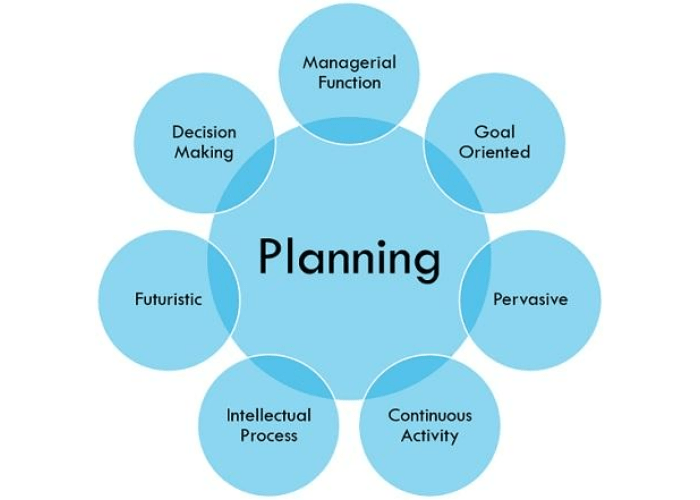Remember the “Home Alone” movie?
It discusses the idea of a child defeating two adults and how he did that.
But have you ever asked yourself for real how he managed that?
You are now thinking “It’s just a movie”
but actually if we looked closer we will see an important idea, that tell us “If you need to do something impossible, you must have a plan for it”
In this world there are two kinds of people “the intelligent and the idiot” and what distinguishes between them is the planning.
But what is the planning?
Planning is simply thinking before taking action. It helps to take a peep into the future and decide in advance the way to deal with any situation, which we are going to face in the future.
It includes logical thinking and rational decision making.
That’s for your personal life, But what if you have a business, how can you define the planning ?
Planning is an essential management mission, which includes deciding in advance, what is to be done, when is it to be done, how it is to be done and who is going to do it.
It is an ideological process which lays down an organisation’s objectives and develops different courses of action, by which the organisation can attain those objectives. It shows exactly how to attain a specific goal.
Importance of Planning

By: https://dribbble.com/shots/9065136-The-Importance-of-Having-a-Head-on-Your-Shoulders
⦁ It reduces the percentage of the risk and uncertainty, by looking ahead into the future.
⦁ It helps to improve future performance, by firming objectives and choosing a course of action, for the interest of the organisation.
⦁ Detecting and identifying future chances and threats performance with the standard performance and efforts are made to correct the same.
⦁ Stating in advance, what should be done in future, so it supplies directions for action.
⦁ It simplifies the coordination of activities. Therefore, reduces overlapping among activities and eliminates non-productive work.
⦁ It’s considered as a Measuring tool for your business efficient qualification skills, level in market track and for the level of communication with your audience.
Features of Planning
Planning is responsible for setting objectives, targets, and format plans to achieve them. The activity helps managers analyse the present condition to identify the ways of attaining the desired position in future. It is both the need of the organisation and the responsibility of managers.

1- Managerial function:
Planning is a first and foremost managerial function provides the base for the other functions of management, as an example: organising, staffing, and directing, as they are performed within the many of the plans made.
2- Pervasive:
It is pervasive in the sensibility that it is present in all the pieces and is required at all the levels of the form. Although the field of planning changes at different levels and departments.
3- Unstoppable Process:
Plans are made for a specific term, say for a month or a year, once that period is over, new plans are pulled, considering the organisation’s present and future requirements and conditions. So, it is an ongoing process, as the plans are framed, carried out and followed by another plan.
4- Target oriented:
It focuses on defining the goals of the organisation, identifying alternate kinds of action and setting the suitable action plan, which must be undertaken to reach organisation goals.
5- Intellectual operation:
It is a mental exercise that involves the application of mind, to think, forecast, imagine intelligently and innovate.
6- Futuristic:
In the process of planning we take a peep from the future, to analyse and predict it so that the organisation can face future challenges effectively.
7- Decision making:
Decisions are made related to the choice of alternative courses of action that can be undertaken to reach the goal. The alternative chosen should be best among all, with the least number of the negative and highest number of positive outcomes.
Different types of plans:

Planning to Plan: “fail to plan, plan to fail’’
While I can’t speak to all facts of life, this is certainly true in business. Managers find themselves planning for all sorts of things. So much so, that planning is one of the four major functions of management. In doing so, a manager can be certain that he or she is working toward some organization goal.
Strategic Plans:
To best understand the relationship between the different types of plans, let’s start at the top. Strategic plans are designed with the entire organization in mind and begin with an organization’s mission. Top-level managers, such as CEOs or presidents, will design and execute strategic plans to paint a picture of the desired future and long-term goals of the organization. Essentially, strategic plans look ahead to where the organization wants to be in three, five, even ten years. provided by top-level managers, serve as the framework for lower-level planning.
Tactical Plans:
Now that you have a general idea for how organizational planning evolves, let’s look at the next level of planning, known as tactical planning. Tactical plans support strategic plans by translating them into specific plans relevant to a distinct area of the organization. Tactical plans are concerned with the responsibility and functionality of lower-level departments to fulfill their parts of the strategic plan.
Operational Plans:
They are the plans that are made by frontline, or low-level, managers. All operational plans are focused on the specific procedures and processes that occur within the lowest levels of the organization. Managers must plan the routine tasks of the department using a high level of detail.
